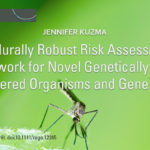
Procedurally Robust Risk Assessment Framework for Novel Genetically Engineered Organisms and Gene Drives
Jennifer Kuzma, March 8, 2019 | This article reviews the current state of gene-editing regulation for crops, illuminating the ways in which technology developers are repeating practices that may lead to the public and ethical failures of the first generation genetically engineered crops, and argues that the contentious socio-political history of genetic engineering will repeat itself for gene editing if these continue....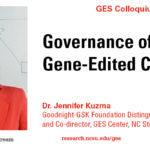
GES Colloquium | Jennifer Kuzma – Regulating Gene-Edited Crops
GES Colloquium, 2/5/18 - Jennifer Kuzma | Crop gene editing emerged just over a decade ago as a promising set of biotechnology techniques designed to more quickly and precisely introduce new or altered genes to change plant characteristics for better growth, product quality, processing, nutrition, or sustainability. Scientists in academia and the ag-biotech industry alike are promoting gene editing, through techniques such as CRISPR-Cas9, as the start of a second biotechnology revolution in agriculture. ...Continue reading "GES Colloquium | Jennifer Kuzma – Regulating Gene-Edited Crops"
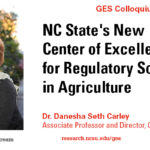
GES Colloquium | Danesha Carley, NC State’s New Center for Excellence in Regulatory Science in Agriculture
GES Colloquium, 4/2/18 - Danesha Carley, NC State's New Center for Excellence in Regulatory Science in Agriculture | Currently, there is a lack of university programs in regulatory science specifically related to agriculture. There is a need for a new program that can provide undergraduate, graduate, and continuing education opportunities in regulatory science, and also provide a forum for the advancement of regulatory science in agriculture. With the importance of regulatory science for innovation in agriculture, and the leadership position that NC State has established in the arena of agricultural advances and technology, we are forming a Center of Excellence for Regulatory Science in Agriculture (CERSA)....
GES Colloquium | Teshanee Williams – Using Cognitive Story Structures to Examine Influence in the Regulatory Review Process
GES Colloquium, 3/19/18 - Teshanee Williams - Using Cognitive Story Structures to Examine Influence in the Regulatory Review Process | Genetically engineered salmon have been approved for human consumption in the United States (US) and Canada, but it has only been released for sale in Canada. In the US, opposition to the approval caused regulatory agencies to update the voluntary labeling guidance, requiring food manufacturers to label foods disclosing information about bioengineered foods and bioengineered food ingredients. Still, some scholars have emphasized the need for risk management to be inclusive of narratives beyond that of the elitist risk assessment and reduction approach....
GES Colloquium | Lisa M. Rasmussen – What WWII Scabies Experiments Teach Us About Unregulated Research
GES Colloquium, 4/23/18 - Lisa Rasmussen | Of Mites and Men: What WWII Scabies Experiments Teach Us About Unregulated Research - The number of British soldiers suffering from scabies during WWII significantly affected the war effort. Consequently, the British military funded researcy to study the transmission and treatment of scabies. This colloquium looks at how the researcher interpreted ethical obligations to human subjects prior to modern codes and regulations, and what that can teach us about the ethics of new, unregulated forms of research. ...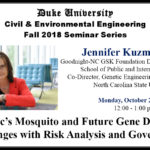
Jennifer Kuzma – Oxitec’s Mosquito and Future Gene Drives (at Duke University)
Duke University Civil & Environmental Engineering | Fall 2018 Seminar Series Oxitec’s Mosquito and Future Gene Drives: Challenges with Risk Analysis and Governance Abstract: In this presentation, I will discuss the current risk assessment and oversight challenges...Continue reading "Jennifer Kuzma – Oxitec’s Mosquito and Future Gene Drives (at Duke University)"
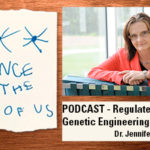
Podcast: Regulate This!: How Genetic Engineering is Regulated, with Jennifer Kuzma
Podcast - Regulate This!: How Genetic Engineering is Regulated Dr. Jennifer Kuzma from NC State walks us through the complicated world of regulations that control how genetically engineering plants and animals make into our world and onto our plates. Really interesting conversation with broad implications for how society regulates complex technologies. Length: 1 hour, 28 minutes...
EU ruling on gene-edited plants and GMOs is more status quo than disruptive
Prior to the recent European Union ruling regarding gene-edited plants, opponents stoked fears that these new gene editing techniques were a loop-hole for big agricultural companies to release their untested, dangerous GMOs onto an unsuspecting...Continue reading "EU ruling on gene-edited plants and GMOs is more status quo than disruptive"
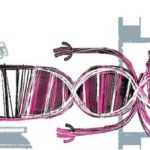
Kuzma Urges a Broader Conversation on Underlying Ethics of Gene Editing Technology
Source: Financial Express This Man Rewrites the Genetic Code of Animals By: Aki Ito | July 19, 2018 In this article about Dan Carlson, a scientist bioengineering hornless cattle, Jennifer Kuzma, co-director of the Genetic...
Kuzma quoted on ecological impacts and regulation of GE products
To critics, the case laid bare glaring weaknesses in the country’s oversight of genetically engineered, or GE, crops. While biotechnology’s defenders say the process is already overly rigorous, others have long argued that regulations, which haven’t changed significantly since 1987, don’t do enough to protect agriculture and the environment. Neither the USDA nor any government agency must weigh the full social, economic and ecological impacts of GE products, says Jennifer Kuzma, co-director of the Genetic Engineering and Society Center at North Carolina State University. “There’s really no place that’s looking at this broadly from a risk-benefit perspective.”...Continue reading "Kuzma quoted on ecological impacts and regulation of GE products"

Jennifer Kuzma on Institute for Emerging Issues First in Future podcast
December 12, 2017 Dr. Jennifer Kuzma speaks with Leslie Boney, Director of the Institute for Emerging Issues (IEI) at NC State on the First in Future podcast. In this pod, Dr. Kuzma discusses gene edited...Continue reading "Jennifer Kuzma on Institute for Emerging Issues First in Future podcast"

Gene Drives and Responsible Innovation
It is not often that a new technology is at once hailed as a potential solution to pandemic disease, wildlife conservation and hunger, while also being feared as a potential military and environmental “bioweapon.” Gene drives,...
Funders respond to NASEM Gene Drive study
Funders of the National Academy of Sciences consensus study Gene Drives on the Horizon (2016) have published a response to the report in the December 2017 issue of Science. The study summarized "current understanding of the scientific discoveries related to gene drives and their accompanying ethical, legal, and social implications," and was co-authored by Dr. Jason Delborne, associate professor of science, policy and society in the College of Natural Resources and executive committee member of the GES Center....Continue reading "Funders respond to NASEM Gene Drive study"

Politics “Trumps” Science in the Regulation of Genetically Engineered Crops
In recent years, the regulatory system for biotechnology products has not kept pace with newer ways of engineering organisms, such as through the use of gene editing like CRISPR-Cas9 systems. Under the Obama administration, progress had been made in clarifying U.S. biotechnology regulations. In January 2017, in the last few days of Obama’s term, several proposals were made for updating agency regulations and guidance documents. In particular, new US USDA regulations were proposed for GE crops. Fast forward ten months, and the Trump administration has pulled this proposed rule back to “start fresh” and reconsider the issue. This is no surprise, as it is not uncommon for new political administrations to recall regulatory policy for biotech. Many industry and academic scientists developing GE crops are pleased to hear about the Trump administration’s recall of USDA proposed regulations....Continue reading "Politics “Trumps” Science in the Regulation of Genetically Engineered Crops"
